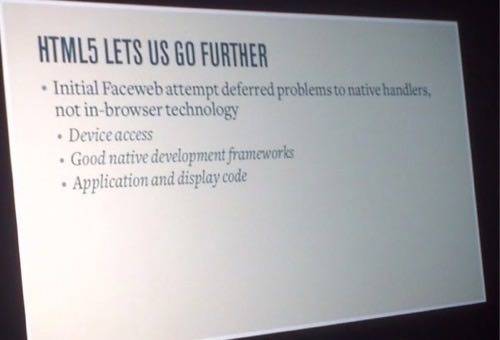So, there is going to be a Facebook Phone, if a week long series from AllThingsD can be trusted. It will come from HTC, the same original equipment manufacturer that brought us the ChaCha and the Salsa, some of the first smartphones with the “F” button concept that brought users straight to a Facebook interface for a social layer baked right into the device. Facebook needs to continue its hard push into mobile, but does a dedicated device, based on Android, make any sense?

Foremost, Facebook might want to consider changing the name of the mobile platform. Facebook Phone does not inspire confidence in consumers. It was code-named Buffy when it was being developed by a team of top-notch engineers more than a year ago. That was a derivative of the “social layer” that was nicknamed “slayer” by the group. One of the reasons that Google has done so well is because Android sounds cool and Google did not change the name when it bought the company from Andy Rubin in 2005. There is a lot of potential things to like, or hate, from a Facebook Phone. We examine those and it is also the topic of this week’s ReadWriteMobile poll. Vote below.
Crux of Facebook’s Mobile Plan: The Web
The Facebook Phone will be built on Android probably in much the same way as Amazon did with the Kindle Fire. Yet, also much like the Kindle Fire, Facebook’s approach will be centered on the mobile Web.
Facebook has two distinct beliefs in its approach to its platform: it is built of the Web and it is inherently social. Think of the Open Social Graph as a tree that roots itself across the Internet. That graph branches almost everywhere that the Web can go. It is the core strength of the company and there is no way that Facebook would create a smartphone that did not inherently tap in to that great strength. Take a look at how Facebook was designed to write once, run everywhere and get into the nitty-gritty of Dave Fetterman’s words and you will have a good understanding of the approach that Facebook takes.

Image: Fetterman on stage at f8.
This is the base for the “slayer” concept. Adding a social layer to mobile to such depths that no other company can. We have seen apps use social as an engagement layer through services like Socialize, but that is a drop-in SDK, not a platform. Facebook as a platform could lay on top of Android and push everything through Facebook’s services, such as messaging, photos (Facebook is, after all, the biggest photo sharing site in the world), Skype, events and contacts. The way Facebook wins on Android is by making Facebook the portal to the Web, in your pocket wherever you go.
But there is a different, and very important, side to this conversation that is not just about the Web and the slayer concept. An application ecosystem is paramount to success in mobile.
Reconciling Facebook and Android Apps
We have known for some time that Facebook will push an HTML5 Web app ecosystem through its platform. Facebook CTO Bret Tayler say at Facebook’s f8 developer conference that the company has no immediate plans for a centralized app repository. Given Facebook’s focus on sharing, that makes perfect sense. By making app discovery social, Facebook increases the amount of connections it can make between users, increasing the strength of the social graph.
This is where Facebook can take a note from an unlikely name in the mobile space that does social app sharing very well: BlackBerry.
One of the keenest things that Research In Motion has done with the BlackBerry Messenger is the ability to send apps as data packets to friends. If you want to share an app with a fellow BlackBerry user, send it through BBM and the recipient will download it upon arrival. Facebook does not have that particular function yet but it is within easy reach of the Facebook Messenger app, which is a stand-alone app from the Facebook platform on mobile devices. In terms of viral growth, that is probably Facebook’s best bet of spreading Web apps through mobile devices.
A prong of Facebook’s mobile attack will be how it evolves with HTML5 applications. We have studied that several times on ReadWriteWeb and the crux is lays with the above notion of the Web. Yet, no matter how many Web apps the Facebook developer ecosystem can build with HTML5, Android will always have more and, in many ways, better apps.

Is this really a problem for Facebook? The answer, likely, is no. In a Facebook Phone, the company could fairly easily institute a sharing button for native Android apps. The primary question though is whether Facebook allows the full Android Market onto its platform devices. Many users will want it but there are alternatives, such as GetJar, which already is a great way for Kindle Fire users to escape the ardent filter of the Amazon Appstore.
Apps naturally lead to the question of payment. Facebook Credits would have to be the default system for Web apps through its platform devices. The growth potential there is great for Facebook and its developer ecosystem. Yet, how does Facebook handle non-Web apps, especially if there is Android Market integration? Does Google Checkout have to live next to Facebook Credits? This is one of the reasons that Amazon makes it basically impossible to access the Android Market on the Kindle Fire, so as to push all payments through its One-Click purchasing solution. Facebook has to decide where it straddles the line of “open” when it comes to its platform and using Android. The app ecosystem, unto itself, could not pose many problem. More apps, more people, better for all. The transactional nature of payments and the flow of money? Big problem.
Benefit To The Ecosystem?
The why of a Facebook Phone is straightforward: mobile is where users are going to be spending the vast amount of their computing time in the near future. How: through HTC with the mobile Web layered on top of Android tied strongly to the Facebook social graph.
How does a dedicated Facebook Phone benefit the mobile ecosystem? Does it give users an option that they would rather use outside of iPhone, Android, Windows Phone, BlackBerry, Symbian, Tizen , webOS or Bada? Does the concept of a social layer sell devices? Can Facebook develop an enticing enough app ecosystem to pull users from the other platforms? This is the crux of the poll for this week. Vote and let us know in the comments what the benefit of a Facebook Phone would be.

















